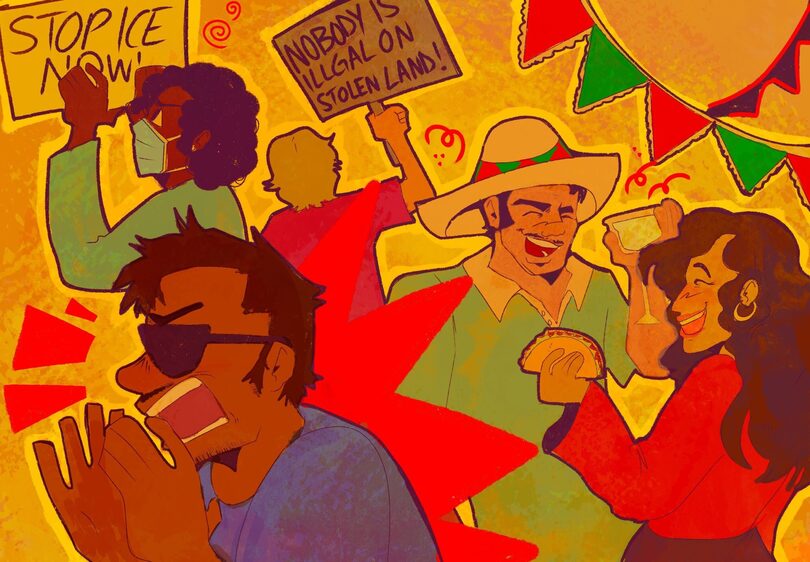Opinion: Resist legalized racism with collective empathy this Latine Heritage Month

Our columnist argues 2025's Latine Heritage Month marks the time to stray from empty celebration and a time to foster collective resistance against structural racism. Active thoughtful engagement will preserve competent discourse. Jalyn Conkrite | Contributing Illustrator
Get the latest Syracuse news delivered right to your inbox.
Subscribe to our newsletter here.
Latine Heritage Month, my favorite time of year, has returned. But this year’s demoralizing times have demonstrated the ease of seeking ignorant bliss, outweighing this month’s engaging on-campus Latine student-led cultural events.
Modern celebration of Latine Heritage Month has become a wretched offense to the communities I love and come from. I’m forced to ask whether events like Mexican Independence and other cultural holidays will be clouded by ICE raid threats as communities are forced to leverage cultural pride for safety.
As the Mexican Student Association president, a first-generation immigrant, the daughter of parents who now have an institutionally-conditioned target on their backs and simply a human, it’s deeply personal to me that we collectively regain empathy and natural solidarity.
Basking in the privilege of whiteness and ignorance alike is a fruitless holy grace. Once the constitutional rights of one group have been infringed upon, the rights of others have historically proven to dwindle. Rights shifting from what we’re conditioned to trust destabilizes people’s sense of security, which is a perilous line to erasure and enhanced assimilation.
Numerous times, we’ve seen immigration enforcement officers detain people based on working a low-wage job or their physical and verbal traits.
As of Sept. 8, our Supreme Court leaders paused a ruling by a federal judge in Los Angeles that imposed restrictions on federal agents’ capacity to racially profile “criminals” that might be in the United States illegally.
In her dissent of the stay in appeal, Justice Sonia Sotomayor wrote, “We should not have to live in a country, where the Government can seize anyone who looks Latino, speaks Spanish, and appears to work a low wage job. Rather than stand idly by while our constitutional freedoms are lost.”
According to DHS estimations, there’ve been around 332,000 people deported to the border since the beginning of the Trump administration, most of which being Mexican, followed by Guatemalans, Venezuelans and Hondurans. Some government officials have called this the “largest mass deportation operation” in U.S. history.
In upstate New York, ICE raids are devastating workplaces. On Sept. 7, a food manufacturer in Cato was spontaneously raided by over 50 federal agents and Cayuga County and Oswego County sheriff’s deputies. Seventy people were detained and deported, with many workers alleging that agents were detaining “anyone who was Hispanic working in the factory.”
Some of the workers were legally in the country and wrongfully detained without being allowed to procure their government documents – which were in their cars – before being taken away, according to Syracuse.com.
Being told to celebrate the same identity that is simultaneously being preyed upon is a constantly looming paradox.Valeria Martinez-Gutierrez, Columnist
And it’s vital for me to emphasize that the ongoing mass deportations undermine a wider late-stage capitalistic paradigm, which increasingly exploits cheap labor for exponential profit margins that exacerbate the polarization of the wealth gap.
Prison labor has become increasingly entrenched with American food system production, causing a push to detain immigrants in state-operated facilities. Notorious maximum-security prisons, extensions of former plantations like Angola, keep prisoners picking fields beneath armed horseback guards for cents.
Most immigrants arrested by ICE in recent months have had no criminal convictions or even charges against them at all, according to the Cato Institute. In fact, undocumented immigrants are arrested at less than half the rate of native-born U.S. citizens for violent and drug-related crimes, and a quarter of the rate for property crimes.
So if criminality hasn’t been a constant basis of detention and deportation, then the crime seems to be the color of their skin – evidenced by citizens all over the country being wrongfully beaten-down, kidnapped and then released by masked-officers.
And with the Supreme Court essentially ruling racism as lawful, it’s hard to think my ethnicity isn’t being policed, politicized and suppressed.
Being told to celebrate the same identity that is simultaneously being preyed upon is a constantly looming paradox. It’s exhausting having to pretend like everything’s okay when the fabric of your reality is distorted day-by-day, so community is key and solidarity is vital.
It’s imperative for allies to show up for Latine Heritage Month’s culturally enriching events – and moving forward – to diffuse the target on our communities and lessen the gap in intercultural understanding.
The weight of collective racial targeting is heavy, but sharing that burden within ourselves and allies helps alleviate necessary support networks in face of selective empathy’s deafening silence.
Consumption without solidarity is adjacent to appropriation. This Latine Heritage Month, especially, we must challenge structural racism and replace mindless doomscrolling with thoughtful involvement.
Come to the Latine Heritage Month opening on Sept. 15 at noon at the Schine Student Center Atrium. There’s near-daily scheduling of authentic programming, starting with MEXSA’s Independence Day Tortilla-Making event on Sept. 16 and concluding with the vibrant Calenton Music Festival on Oct. 26.
Some forms of resistance come as easily as placing Mexican or Latin American flag decals on allies’ cars to broaden authorities’ target.
Support street vendors, volunteer with the Immigrant Justice Campaign as a translator, panel or platform local immigration justice organizations such as Syracuse Immigrant & Refugee Defense Network to support those under siege.
The backbone of our delicious food and beautiful traditions is our people. I’m not asking for an in-depth understanding of class or racial disparities. Rather, I’m calling for thoughtful engagement that encourages community, culturally competent discourse and solidarity.
Valeria Martinez-Gutierrez is a senior majoring in geography, sociology and environment, sustainability and policy. Her column appears bi-weekly. She can be reached at vmarti10@syr.edu.





